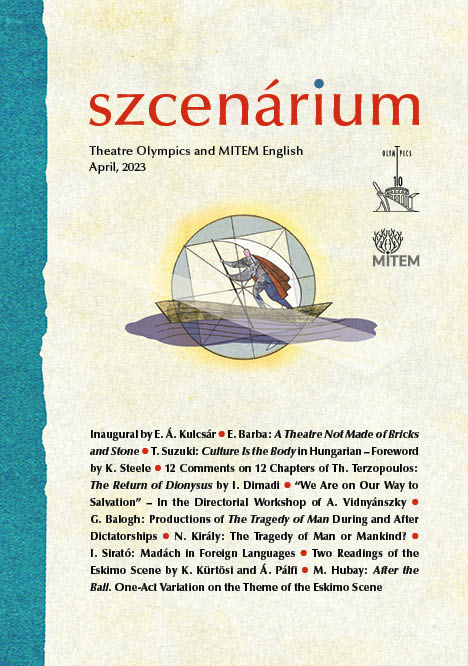Archives 2023
SZCENÁRIUM – THEATRE OLYMPICS AND MITEM 2023
The English language issue of the professional journal of the National Theatre in Budapest has been composed for the guests of the Theatre Olympics and MITEM 2023. The World Theatre and Theory block draws attention to Hungarian-language theatrical publications released for the event, the authors of which will also be present as creators in the programme. In the Madách 200 block, the writings are intended for the participants of the international Az ember tragédiája – The Tragedy of Man project. Our other compilation offers an insight into the directorial work of Attila Vidnyánszky.
INAUGURAL
• Weapons, Muses, Encounters – György Lukácsy Interviewed Edit Kulcsár, the Main Organizer of the Theatre Olympics
WORLD THEATRE AND THEORY
• A Theatre Not Made of Bricks and Stone – Eugenio Barba – Nicola Savarese: The Five Continents of Theatre (fragment)
• Tadashi Suzuki: Culture Is the Body. Preface by Gábor Viktor Kozma to the Hungarian Edition
• Theodoros Terzopoulos: The Return of Dionysus. Iliana Dimedi: 12 Comments on 12 Chapters
• Crossing Boundaries, Creating Bridges – Penelope Chatzidimitriou: Tadashi Suzuki and Theodoros Terzopoulos
IN THE DIRECTORIAL WORKSHOP OF ATTILA VIDNYÁNSZKY
• Ágnes Pálfi– Zsolt Szász: Poetic And/Or Epic Theatre?
• “We Are on Our Way to Salvation” – Roundtable Discussion on the Passion Play of Csíksomlyó
IMRE MADÁCH 200
• Géza Balogh: Productions of The Tragedy of Man at the National Theatre During and After Dictatorships
• Ildikó Sirató: The Tragedy of Man in Foreign Languages and on Foreign Stages
• Nina Király: The Tragedy of Man or Mankind?
• Katalin Kürtösi: “More of Seals” – Inuit-Representations in The Tragedy of Man
• Miklós Hubay: After the Ball. One-Act Variation on the Theme of the Eskimo Scene
• Ágnes Pálfi: The Pregnancy of Feminine Vigilance in The Tragedy of Man. A Reading of the Eskimo Scene
PHOTO EXHIBITION
Pictures from the Madách exhibition at the Hungarian Theatre Museum and Institute (OSZMI)
“What is theatre? A building? The Comédie-Française, the Aleksandrinski, the Dramaten? Is it an institution, a financial enterpprise, a cooperative? Theatre is the women and the men who do it. Nevertheless when we visit Drottingholm, Versailles, the Olympic Theatre in Vicenza, or one of the small theatres with which the princes, the courts and the Academias embellished their cities, we feel the same kinaesthetic reactions as in a live performance. Those bricks and stones become living space, even if nothing is staged there. They too are a way of thinking and dreaming the theatre, materialising it and handing it down through the centuries.” (Eugenio Barba)
“ [Tersopoulos] named his ensemble after the most ambivalent nickname of God Dionysus. ATTIS (originally typed in capitals when for his group) refers to the ancient Greek, Egyptian and Roman god who castrated himself in frenzy, brought on by wine, music and dancing. Attis (or Adonis or Osiris) is one of the year-Gods sacrificed to the worshiping of the Earth Mother (or Cybele) and for that considered the Hibernal God Dionysus: the seed, the gestation, that which will be born in spring and simultaneously an irrational figure of fecundity, married with the darker side of the self, like Dionysus, like Hades.” (Iliana Dimadi)
“… the Japanese body of resistance in Suzuki’s productions of Greek tragedy, starting with the much celebrated The Trojan Women in 1974, is often female. It is on the female body that masculine aggression and violence is inscribed, especially at times of war. Suzuki’s The Trojan Women, for example, is set among the ruins of a bombarded cemetery immediately after World War II. His women, though surviving a war, are deprived of any cathartic tragic glory and his spectators of any hope for the coming of a harmonious future for humankind.” (Penelope Chatzidimitriou)
“Every dictatorship regarded Madách’s dramatic poem [The Tragedy of Man] as dangerous. When Antal Németh directed it at the Hamburg Staatliches Schauspielhaus in 1937, the Admissions Committee wanted it banned, because it considered the Phalanstery Scene an open attack on the idea of national socialism. It relented after a lengthy debate, on condition that the ominous Scene XII include inscriptions in Cyrillic as a reference to the Soviet Union. The communist one-party state did not dither as much: it simply commanded the play off the stage.” (Géza Balogh)
“Passió by Géza Szőcs is a postmodern venture, in terms of both its texts and as a whole. (…) Knowing »fragmentary dramaturgy« [of Attila Vidnyánszky], we stumbled upon incredible parallels in it and discovered the same perspective as he uses in composing his stage works. (…) It demonstrates that the biblical framework, the dimension of salvation history, can perfectly be reconciled with the postmodern approach, and that contemporary artists of a truly high calibre are not interested in obliterating the foundation of the Christian cult community by replacing the existential philosophical surplus of the Passion of Christ. (…) The Easter tradition, the Passion of Christ, which we experience a new every year, can safely be collated with the postmodern aesthetic creed that there is nothing new under the sun, that everything has already happened before.” (Ágnes Pálfi)
(06 May 2023)












